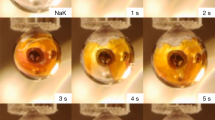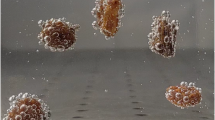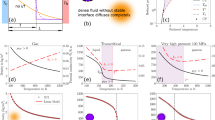Abstract
A PECULIAR creeping film that is similar to the superfilm of liquid helium II, but which occurs at room temperatures and has a much lower transfer rate, takes place in saturated potassium chloride aqueous solution. In an electrolytic experiment using saturated KCl solution as the salt bridge, we noticed that without any disturbance the solution could not be kept in the beaker all the time. A thin surface film creeps up the beaker wall very slowly, about several centimetres a day, flows out over the brim and then down the outside surface of the beaker. Creeping can also be observed up the surface of the electrode and the salt bridge tube (Fig. 1). On surfaces over which the film has crept, potassium chloride crystals form as the water in which KCl is dissolved evaporates. Within a few days the solution in the beaker drains out completely and the entire surface of the beaker becomes covered with a thin layer of potassium chloride crystals, about 10−2 cm thick.
This is a preview of subscription content, access via your institution
Access options
Subscribe to this journal
Receive 51 print issues and online access
$199.00 per year
only $3.90 per issue
Buy this article
- Purchase on Springer Link
- Instant access to full article PDF
Prices may be subject to local taxes which are calculated during checkout
Similar content being viewed by others
Author information
Authors and Affiliations
Rights and permissions
About this article
Cite this article
HUANG, BJ., HUANG, JC. Creeping-film phenomenon of potassium chloride solution. Nature 261, 36–38 (1976). https://doi.org/10.1038/261036a0
Issue Date:
DOI: https://doi.org/10.1038/261036a0
This article is cited by
-
Formation and development of salt crusts on soil surfaces
Acta Geotechnica (2016)
-
Evaporation rate of concentrated electrolyte solutions from fine capillaries
Journal of Engineering Physics (1979)
-
The creeping-film phenomenon of potassium chloride solution
Nature (1976)
-
The creeping-film phenomenon of potassium chloride solution
Nature (1976)
-
The creeping-film phenomenon of potassium chloride solution
Nature (1976)
Comments
By submitting a comment you agree to abide by our Terms and Community Guidelines. If you find something abusive or that does not comply with our terms or guidelines please flag it as inappropriate.



